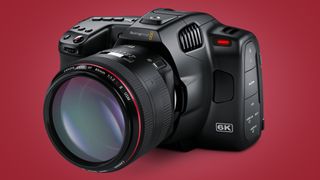Blackmagic Pocket Cinema Camera 6K Pro arrives with flagship filmmaking tools
New flagship could be another hit with indie movie-makers

Blackmagic is renowned for being a darling among indie and beginner filmmakers – and its new flagship Pocket Cinema Camera 6K Pro looks likely to strengthen that reputation.
A revamped version of the existing Pocket Cinema Camera 6K, this new Pro model brings some very handy new features, including a tilting screen, better battery and built-in ND filters.
The new model sits at the top of Blackmagic's now three-strong lineup of Pocket Cinema Cameras, alongside the standard 6K model and the Blackmagic Pocket Cinema Camera 4K. But despite being the range's most premium model, it offers a lot of filmmaking bang for its buck.
Like the existing 6K model, it has a Super35 sensor (which is a popular filmmaking format that's similar in size to APS-C chips) and works with Canon EF lenses, which means it has a huge range of compatible glass.
The camera's 'Pocket' name is a slight misnomer, as it's a little beefier than the 6K model, weighing in at 1,238g and measuring 123x180x112mm. This gives it a DSLR-style heft, but also means it's able to be the most powerful camera in the range so far.
Perhaps the biggest news is that the Pocket Cinema Camera 6K Pro has a tilting screen, which was a much-requested feature from fans of its previous cameras. This 5-inch touchscreen LCD is also brighter than the standard 6K model's display, offering a maximum of 1,500 nits, which should make it much more usable in daylight.
Another bonus is the improved NP-F570 battery, which promises to last for around 60 minutes from a full charge (when shooting 6K/24p raw footage). If you're planning a long shoot out in the field away from charging points, there's also a new Blackmagic Pocket Battery Pro Grip, which adds two extra batteries for over three hours of shooting from a charge.
Get daily insight, inspiration and deals in your inbox
Get the hottest deals available in your inbox plus news, reviews, opinion, analysis and more from the TechRadar team.
- These are the best Youtube cameras you can buy right now
- Or check out our guide to the best 4K cameras in the world
- Read our in-depth Blackmagic Pocket Cinema Camera 4K review


Pro tools
For its relatively low price tag, the Blackmagic Pocket Cinema Camera 6K Pro brings a range of other handy new features, too.
One of the most useful are its built-in ND filters. These motorized filters let you reduce the amount of light entering the camera to achieve smoother motion in bright conditions, and are available in two, four and six-stop variants. They've also apparently been designed to match the color science of the camera, which is now the same as the higher-end Ursa Mini Pro 12k.
This new Pocket Cinema Camera also has boosted audio options, too, thanks to the addition of a second mini XLR connection, which are the connectors used for capturing pro-level audio. This means you can record two separate audio tracks using two microphones, without needing an external mixer. You also get a 3.5mm audio input for hooking up external microphones, plus a built-in speaker and 3.5mm headphone jack for playback.
The final big new feature is an optional electronic viewfinder, which slots into the Pocket Cinema Camera 6K Pro's hotshoe mount. This OLED EVF costs $495 / £425 / AU$789 and has a 1280×960 resolution, proximity sensor and four different types of eyecups for both left and right eyes.
Overall, then, the Blackmagic Pocket Cinema Camera 6K Pro is shaping up to be a very fine new tool for indie filmmakers. It packs an awful lot of pro video power into a pretty small body – and compared to rival mirrorless cameras like the Canon EOS R5, is relatively affordable.
You can buy it right now for US$2,495 / £1,879 / AU$3,935 – that's around twice the price of the Pocket Cinema Camera 4K, but the larger sensor and all-round feature set should make Blackmagic's new flagship another hit with filmmakers.
- These are the best vlogging cameras you can buy right now

Mark is TechRadar's Senior news editor. Having worked in tech journalism for a ludicrous 17 years, Mark is now attempting to break the world record for the number of camera bags hoarded by one person. He was previously Cameras Editor at both TechRadar and Trusted Reviews, Acting editor on Stuff.tv, as well as Features editor and Reviews editor on Stuff magazine. As a freelancer, he's contributed to titles including The Sunday Times, FourFourTwo and Arena. And in a former life, he also won The Daily Telegraph's Young Sportswriter of the Year. But that was before he discovered the strange joys of getting up at 4am for a photo shoot in London's Square Mile.
Most Popular

